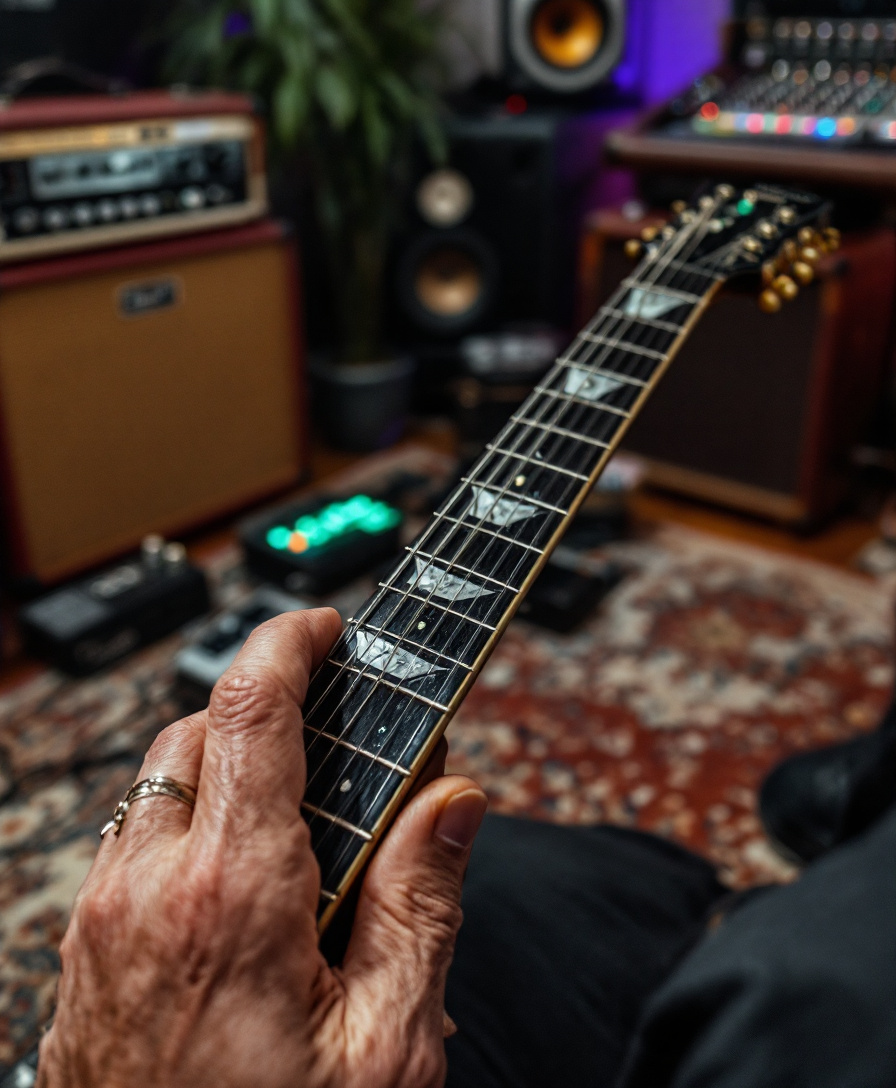
The question of balancing your music passion with day job is often pondered by musicians. The demands of a full-time job and a passion for music can feel like you’re walking a tightrope. One misstep, and something might fall by the wayside.
But who says you can’t have both!
What’s a life as a musician? It’s all about understanding your priorities while keeping your creative spirit alive. Balancing music passion with day job is a process that’s tangible.
Setting achievable goals is your first stride towards success. Instead of aiming to release a full album by the year’s end, maybe start with a few singles or mastering a new instrument. Small victories build confidence and keep you motivated without overwhelming your to-do list.

Crafting a schedule that respects both your job and your music is important. Carve out specific time slots for music, just as you would any important meeting. Whether that’s weekend afternoons or weekday evenings, stick to it religiously.
This way, your musical dreams don’t become just another weekend wish list.
Don’t underestimate the power of short, focused sessions. Even if you can only squeeze in 15-20 minutes of practice or creativity during a lunch break or commute, it can make a difference. Quality trumps quantity here, and regular short bursts can sustain your progress.
Don’t look at everyday tasks as just mandatory chores; they are potential creative windows. Ever thought about using your commute to brainstorm song ideas or listen to new genres for inspiration? It’s an opportunity to keep your passion alive without extra dedicated hours.
Sometimes, achieving balance means letting go and asking for help. Delegating mundane chores or hiring out tasks when possible can free up time you can channel into your music. It’s about smart management of resources to cultivate your art.
Establish a consistent morning or evening practice routine that works around your work schedule – for instance, dedicating 30-60 minutes before heading to the office or after returning home.
This helps maintain steady progress without compromising professional responsibilities, and the regularity builds momentum in your musical development.
Create a dedicated music space in your home that remains set up and ready to use, complete with your instruments, recording equipment, and practice materials.
Having an accessible workspace eliminates setup time and reduces friction between you and your practice sessions, making it easier to maximize limited free time.
Use your lunch breaks and commute time strategically by listening to music you’re learning, studying theory through audio lessons, or working on songwriting ideas through voice memos.
This transforms otherwise “dead” time into productive musical development without impacting your work performance.
Schedule focused weekend sessions for longer projects like recording, intensive practice, or collaboration with other musicians.
Treat these as non-negotiable appointments, just as you would work meetings, while maintaining flexibility for occasional work obligations or family commitments.
Integrate your musical pursuits into your professional network by sharing your passion appropriately with colleagues and potentially finding opportunities to perform at company events or connect with other musically-inclined professionals.
This creates synergy between both worlds rather than treating them as completely separate spheres.
Set realistic goals and timelines for your musical projects that acknowledge your work commitments, avoiding the frustration of unrealistic expectations.
Break larger musical ambitions into smaller, achievable milestones that can be accomplished alongside your career responsibilities.
Maintain clear boundaries between work and music time, avoiding the temptation to mix the two (like practicing during work hours) which can lead to reduced performance in both areas.
When you’re at work, focus on work; when you’re practicing or performing, be fully present in your music.
Find ways to monetize your musical skills efficiently through teaching, weekend gigs, or online content creation that doesn’t interfere with your day job.
This can provide additional income while satisfying your creative needs, but be selective about opportunities to avoid overextension.
Build a support network of family, friends, and fellow musicians who understand your dual commitments and can provide encouragement, accountability, and practical help when needed.
Their understanding and backing can be crucial during busy periods when balancing both pursuits becomes challenging.
Regularly reassess and adjust your balance based on changing work demands and musical goals, remaining flexible enough to adapt your routine when necessary.
This might mean scaling back music activities during intensive work periods or taking advantage of slower work seasons to focus more on musical projects.
Burnout is the uninvited guest nobody wants at the party. It sneaks up when you’re stretched thin, trying to be a rockstar at work and with your music. Picking up on the early signs is vital. Persistent tiredness, lack of enthusiasm, or a feeling like you’re never quite getting on top of things mean it’s time to step back.
Managing stress through practical methods is key. Engage in activities that rejuvenate, like a quick workout, meditation, or even a short walk. These might sound basic, but they can replenish mental energy and clear away stress fogging up your creativity.
Music is one of the best forms of therapy. Letting music become a part of your relaxation time is a natural blend of passion and wellness. Whether it’s unwinding with an instrument in hand or listening to an all-time favorite playlist, music serves as a dual-purpose outlet for stress and creativity.
Knowing when to take a break is crucial. Overworking can drain you faster than you’d expect. Pay attention to your body and mind, adjusting your pace as needed. You’ll find that a well-timed break can boost both your job performance and your music-making mojo.
Use your enthusiasm for music to enhance job efficiency. Creative problem-solving, inspired by your musical journey, can lead to innovative solutions at work. Tapping into this passion keeps you engaged on both fronts, almost like two sides of the same coin.
Finding community support helps.
Surround yourself with other musicians or understanding workmates. Sharing experiences and learning from others who’ve walked similar paths can guide you through challenges. This community is not just a sounding board but a reservoir of motivation and new ideas.
Good time management is essential for keeping finances in check. Especially when you’re juggling multiple passions, knowing how to budget time—and money—ensures you can pursue both your job and your musical journey with less stress.

Being a musician is more than just playing an instrument or performing on stage. It’s about creating, expressing, and connecting through your unique sound.
A musician is someone who uses their skills and passion to interpret or compose music, regardless of style or genre.
At its core, being a musician involves three key elements:
Whether you’re a lead guitarist, vocalist, drummer, or producer, the identity of a musician lies in your commitment to your art, your journey of self-discovery, and your power to move an audience.
As a teen in the mid-80s, listening to music on radio or my vinyl records was really special. I felt a deeper connection to the music than most of my friends, who seemed to be only casual listeners. Soaking my soul in music from dawn to dusk was my routine, way before even thinking about playing an instrument.
Between listening and watching MTV, the inspiration within me grew and grew. My motivation for learning to play was not fueled by impressing girls or being in a band to become a rock star. I can’t remember a time that I didn’t enjoy music really.
Whether it’s a catchy song on the radio, a live performance by your favorite artist, or playing your guitar and creating a tune from deep within your soul, life as a musician is beautifully perpetual.
Would love to hear your concerns and experiences about balancing your music passion with your day job. Share them with us below.

I’ve been playing guitar 40 years now; writing, recording, and rocking in bands. Randy Rhoads, Warren DiMartini, and of course, Jimi Hendrix all lit the fire for me, and I’ve been chasing that passion ever since.